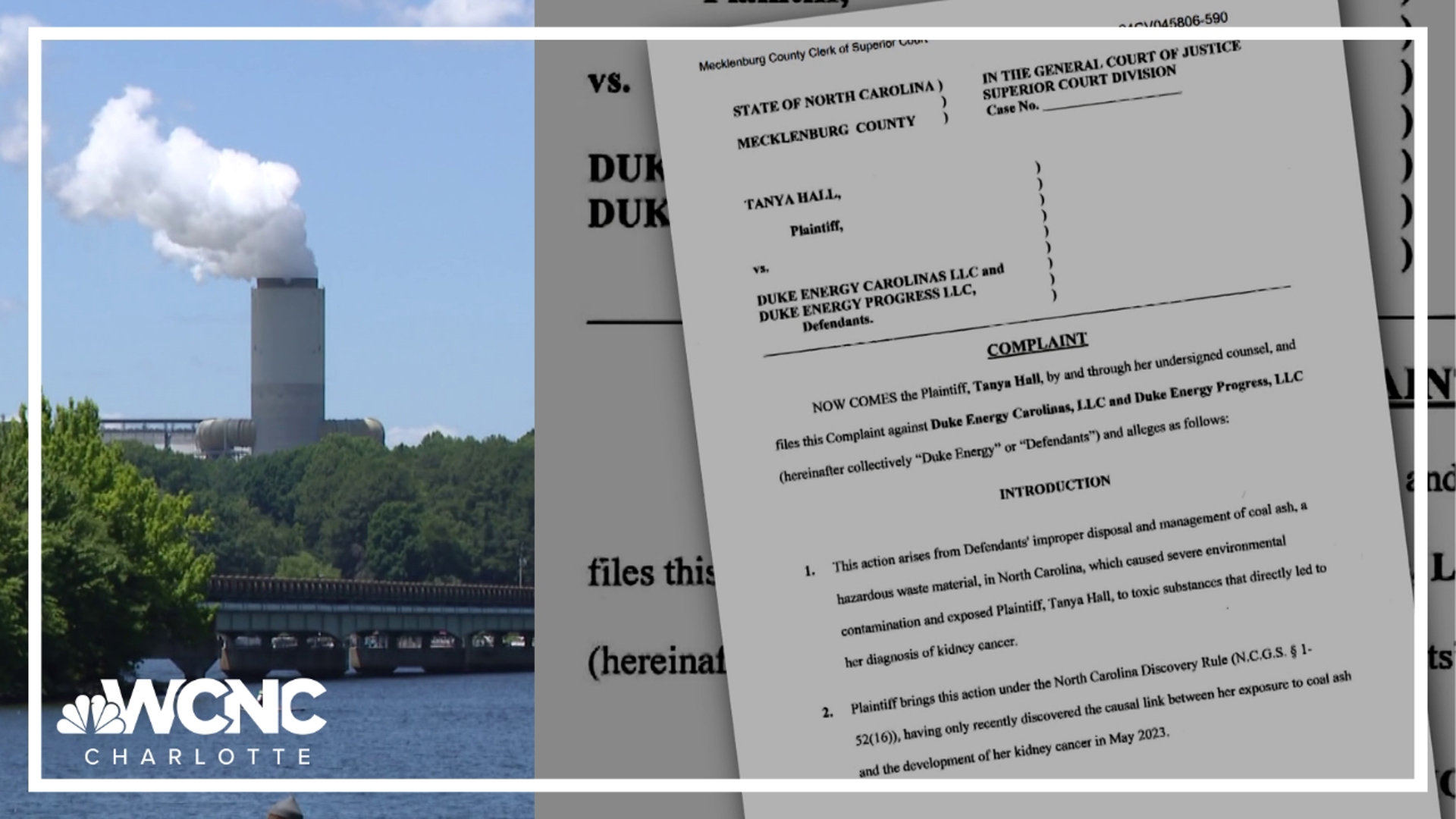CATAWBA COUNTY, N.C. — A lawsuit filed Wednesday accuses Duke Energy of "ultra-hazardous activities" tied to the utility's past handling of coal ash.
Tanya Hall is suing Duke Energy for negligence, along with unfair and deceptive trade practices, among other things. The Sherrills Ford woman lives near the Marshall Steam Station and its unlined coal ash basin and "was unknowingly exposed to toxic contaminants released into the environment" by the utility, her complaint states.
"(Hall) was diagnosed with kidney cancer, a life-threatening illness after living near contamination zones for approximately 8 years," the lawsuit says.
In an interview Wednesday afternoon, Hall said Duke Energy has not been transparent about the risks.
"There used to be fly ash on my car in the morning in my community," she said. "The entire time, Duke Energy has always said, 'Everything is safe. The coal ash is safe. It's not toxic. It's not an environmental hazard.'"
Coal ash is a coal-burning byproduct that contains toxic ingredients, including carcinogens. For months, advocates and scientists have shared concerns with WCNC Charlotte about the dangers of coal ash buried in and around Mooresville, including under Tutor Time of Mooresville. They've warned that long-term exposure is especially concerning.
Samples WCNC Charlotte collected near the day care identified "a cocktail of toxic elements," including risky levels of arsenic and radiation close to the surface.
"By knowingly dumping coal ash near residential and commercial areas, the company exposed Ms. Hall and others to toxic substances while hiding the associated health risks..." the complaint states. "...Defendants' further engaged in fraudulent concealment by deliberately withholding crucial information about the dangers of coal ah. The company's failure to disclose these material facts, which it had a duty to reveal, prevented the public from taking proactive measures, leading to severe health consequences and other damages for Ms. Hall and other residents."
The lawsuit also says questions Hall and others directed to Duke Energy about coal ash being hazardous "were affirmatively denied...on multiple occasions."
"Duke could have done the right thing from the beginning. Duke knew what to do to protect this community," attorney Carlos Moore said. "They could have done better. They knew how to do it, but they were too cheap. They are bad actors. They're gluttons, greedy, selfish and self-serving."
Moore said Duke Energy needs to clean up what's buried underground.
"We believe that if Duke wants to start rectifying this situation, start with our most valuable treasure: our young people," he said. "Get that crap out of the soil near the high school, the day care. Start there. Protect our young."
Following the rules of the time, Duke Energy sold the coal-burning byproduct decades ago to builders as fill dirt. Over the years, the utility has downplayed any potential risks. Hall's attorneys are joining the call for a federal investigation by the Environmental Protection Agency into the extent of contamination in and around Mooresville.
"They knowingly put carcinogens into this community," attorney John Bey said. "I think that if you're going to put a toxin, you're going to bring it to my front yard that you should let me know."
In a letter to EPA Administrator Michael Regan dated July 24, 2024, Earthjustice and Southern Environmental Law Center cited recent samples from a Reed Creek Park streambank they obtained that showed "elevated radioactivity." The sample identified a level of radium more than four times above approximate background levels and potentially above the EPA's cleanup standard, according to the non-profit legal organizations.
In a release Friday, the Town of Mooresville announced results of four soil samples its own staff collected along the Reed Creek Park property.
"The Town of Mooresville is pleased to report that after evaluating the results with members of the EPA, the levels of Radium 226 +228 were well within natural background levels for Radium (<5.0 pCi/g)," the town's statement reads.
In response to those results, Earthjutice attorney Lisa Evans questioned the town's efforts.
"The Town's testing was not designed to find any hazards from coal ash," Evans said in a statement. "The town tested random soil, not coal ash. Their results actually prove our point- that Duke's coal ash contains radium many times background soil. We tested clumps of coal ash released from the upstream Tiremaster's site where the sinkhole feeds into the creek. The Town alleges that the site was cleaned up. Our sample indicates otherwise."
Earlier this week, the Wall Street Journal published a story about the large amount of coal ash within the town.
Duke Energy continues to maintain coal ash is safe, noting trace elements combined make up less than 1% of coal ash. The utility has said in the past there is no research showing coal ash causes cancer.
"Duke Energy’s sales of ash were conducted in accordance with applicable state regulations, which set out how ash could be used in ways that are safe for people and the environment," the utility said in a statement to WCNC Charlotte Wednesday, in part. "As regulations changed over the years, our structural fill practices evolved to comply with all applicable rules. It’s always challenging when people have health issues and are searching for answers, and there are countless risk factors that can contribute to someone’s health condition."

